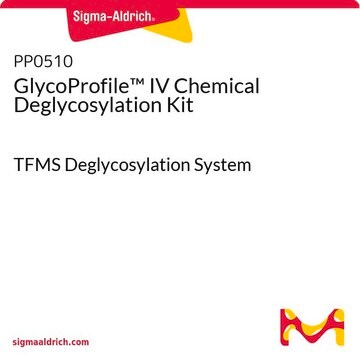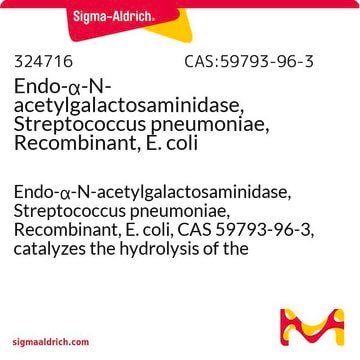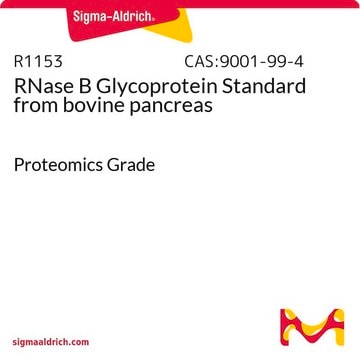G1549
PNGase F aus Elizabethkingia meningoseptica
ready-to-use solution, recombinant, expressed in E. coli
Synonym(e):
N-Glycosidase F, PNGase F aus Chryseobacterium meningosepticum, PNGase F aus Flavobacterium meningosepticum, Peptid-N-Glycosidase
About This Item
Empfohlene Produkte
Rekombinant
expressed in E. coli
Qualitätsniveau
Konjugat
(N-linked)
Qualität
Proteomics Grade
Form
ready-to-use solution
Spezifische Aktivität
≥1000 U/mg
Haltbarkeit
≥1 yr at -20 °C
Mol-Gew.
~36 kDa
Versandbedingung
wet ice
Lagertemp.
−20°C
Suchen Sie nach ähnlichen Produkten? Aufrufen Leitfaden zum Produktvergleich
Anwendung
Biochem./physiol. Wirkung
Einheitendefinition
Physikalische Form
Lagerklassenschlüssel
10 - Combustible liquids
WGK
WGK 1
Flammpunkt (°F)
Not applicable
Flammpunkt (°C)
Not applicable
Analysenzertifikate (COA)
Suchen Sie nach Analysenzertifikate (COA), indem Sie die Lot-/Chargennummer des Produkts eingeben. Lot- und Chargennummern sind auf dem Produktetikett hinter den Wörtern ‘Lot’ oder ‘Batch’ (Lot oder Charge) zu finden.
Besitzen Sie dieses Produkt bereits?
In der Dokumentenbibliothek finden Sie die Dokumentation zu den Produkten, die Sie kürzlich erworben haben.
Kunden haben sich ebenfalls angesehen
Unser Team von Wissenschaftlern verfügt über Erfahrung in allen Forschungsbereichen einschließlich Life Science, Materialwissenschaften, chemischer Synthese, Chromatographie, Analytik und vielen mehr..
Setzen Sie sich mit dem technischen Dienst in Verbindung.









